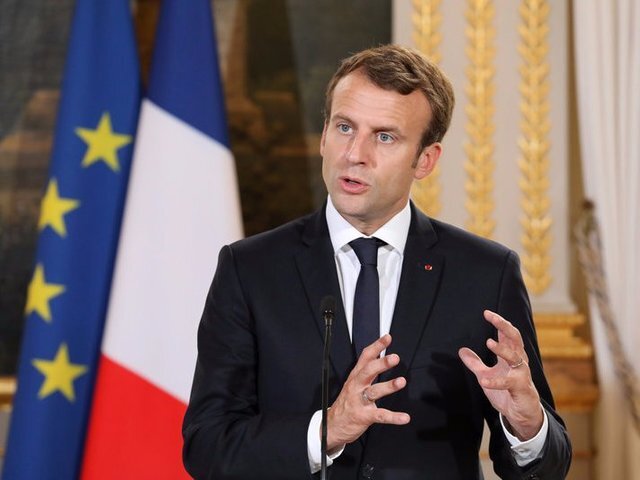Macron says France will try to make sure Iran receive ‘economic advantages’ of nuclear deal

French President Emmanuel Macron has said that his country will try to make sure Iran receives the “economic advantages” of the 2015 nuclear deal, known as the Joint Comprehensive Plan of Action.
In a statement on Tuesday, he called on Iran to reduce its stockpiles of low-enriched uranium.
Macron said that he “took note with concern” of Iran’s announcement that it has surpassed the limit of 300 kilograms (661 pounds) of low-enriched uranium laid out in the accord, according to AP.
Iranian Foreign Minister Mohammad Javad Zarif said on Monday that Iran’s low-grade enriched uranium stockpile has exceeded 300 kg.
Macron asked Iran also abstain from any other steps that would threaten the deal, which promised to lift trade sanctions in exchange for limits on Iran’s nuclear activities.
France strongly opposed President Donald Trump’s decision to withdraw the U.S. from the deal and reimpose sanctions on Iran.
Trump withdrew Washington from the nuclear deal in May 2018 and ordered sanctions against Tehran.
The first round of sanctions went into force on August 6 and the second round, which targets Iran’s oil exports and banks, were snapped back on November 4.
Also, on April 22 the U.S. announced that Washington has decided not to extend waivers allowing major importers to continue buying oil from Iran. The waivers ended on May 2.
On Friday, the remaining signatories of the nuclear agreement met in the Austrian capital as a last-ditch effort to save the accord.
They announced in a statement that the European Union mechanism for trade with Iran, known as INSTEX, is up and running.
After the talks, Abbas Araqchi, Iran’s deputy foreign minister, said progress has been made to save the nuclear deal but the demands of the Islamic Republic are yet to be met.
“It was a step forward, but it is still not enough and not meeting Iran’s expectations,” Abbas Araqchi told reporters in Vienna after almost four hours of talks with senior diplomats from Britain, China, France, Germany and Russia.
European Union foreign policy chief Federica Mogherini has said that INSTEX has become operational and is processing the first transactions.
“On Friday we also gave an important announcement on the defense of the nuclear deal with Iran: the instrument to support legitimate trade exchanges with Iran (called INSTEX) has become operational and is processing the first transactions. Together with the three countries that set it up – France, Germany and the UK – another seven European countries will join the mechanism. On Friday we also gathered the Joint Commission that works to guarantee the deal’s implementation,” she said in an announcement published on her website on Sunday.
Zarif said on Monday that INSTEX fails to meet Iran’s demands.
Iran has demanded Europe to buy Iranian oil as part of their commitments under the nuclear agreement.
NA/PA
Leave a Comment